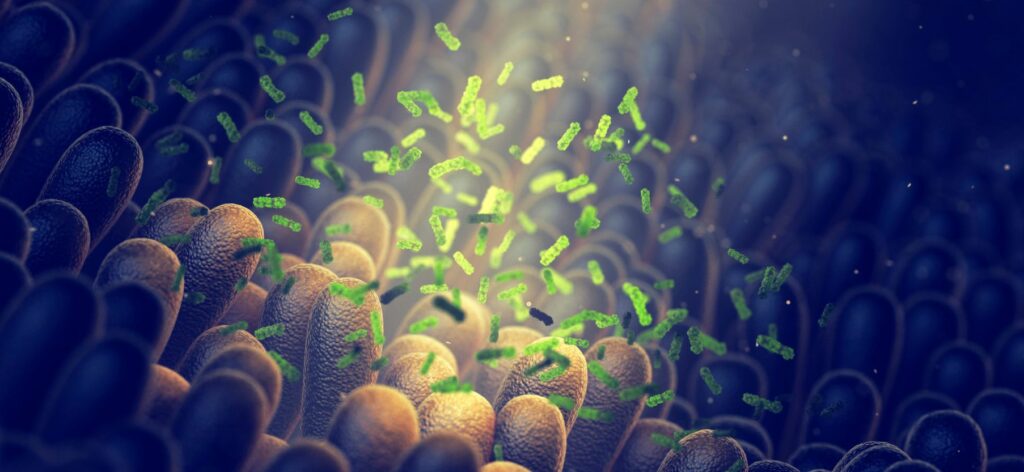Probiotics are the superheroes of your gut. These powerful little bacteria have been shown to help with digestion, boost immunity, and even improve mental health. Recent research suggests they also play a role in breaking down alcohol, making them an excellent candidate for mitigating the after-effects of too much drinking.
But how can probiotics cure a hangover? To understand how this might work, it’s important to know the basics about the microbiome, and the role it plays in how our bodies break down alcohol.
What is the microbiome?
The microbiome is a complex and fascinating ecosystem within our bodies that plays an incredibly important role in maintaining our health. It is composed of billions of bacteria and other microbes, with each playing its own unique part. The microbiome influences how we break down food and absorb nutrients, supports our immune system, and even influences our moods.
According to recent estimates, the average adult human body could contain an average of 39 trillion bacteria — more than the 30 trillion human cells we contain (but less than the common misconception that we have 10 times more bacterial cells than human cells).
These bacteria come from a variety of sources and play a diverse range of roles in our bodies. Some live on our skin, providing a barrier against external pathogens. In the gut, microbes play an important role in digestion, helping to break down food and absorb nutrients. They do this by producing enzymes that help break down proteins, carbohydrates, and fats into smaller molecules that can be absorbed by the body.

Our microbiome is also essential for a healthy immune system; bacteria play an important role in teaching our immune cells about harmless and dangerous particles that enter our bodies, helping the body respond appropriately to potential threats.
Beneficial bacteria can also help protect against harmful pathogens by competing with them for resources like vitamins and minerals. This competition helps keep bad bacteria from reproducing too rapidly or colonizing our digestive systems.
Research has also suggested that certain bacteria may even influence how we process emotions and manage stress. Studies have found that people with higher levels of certain microbes tend to rate their stress levels lower than those with fewer species present.
The microbiome’s role in alcohol processing
The microbiome plays a role in breaking down ethanol and acetaldehyde — two major components of alcoholic beverages. Ethanol is digested by enzymes produced by microbes in our gut. Acetaldehyde is broken down by bacteria that convert it into acetic acid, which is then further metabolized into fatty acids or eliminated from the body through urination or sweat.
The human body is equipped with a number of metabolic processes that help it to break down and process alcohol. When we consume alcoholic beverages, ethanol is the primary component that must be metabolized for our bodies to clear it from our systems.
First, an enzyme called alcohol dehydrogenase (ADH) converts the ethanol molecules into acetaldehyde molecules. These molecules are then further broken down by aldehyde dehydrogenase (ALDH). ALDH, in turn, breaks down acetaldehyde into acetic acid and water, which can then be eliminated from the body through sweat or urination.
In addition to ADH and ALDH enzymes, other metabolic processes also factor into how our bodies break down alcohol. Intestinal bacteria begin breaking down some of the ethanol before it even reaches the liver cells and enters circulation in the bloodstream. This metabolization of alcohol in the gut is called ‘first-pass metabolism’ and occurs through a combination of enzymes that are produced by our cells and those found in the microbiota. The amount of ethanol broken down at this stage varies from person to person depending on diet, age, gender, medications, and microbial composition.
Can probiotics help us break down alcohol?

Probiotics are live microorganisms that can help maintain a healthy balance of bacteria in the gut by competing with “bad” bacteria for space and resources. Studies have shown that probiotic supplementation can protect and repair the gut lining, reducing inflammation while improving digestion and nutrient absorption. Probiotics have also been found to improve immunity by increasing levels of protective antibodies in the body.
Probiotics may also play an important role in how our bodies break down alcohol.
They have been shown to reduce levels of oxidative stress produced by alcohol consumption which helps to protect liver health.
Recent research has also suggested that probiotics may play a role in breaking down alcohol after it is consumed. A recent study showed that probiotic supplements can reduce the amount of alcohol our bodies are able to absorb. How exactly this works is still being researched, but it appears that these friendly bacteria help convert alcohol into harmless acids which can then be eliminated from the body more quickly than usual.
While further research is needed on the exact mechanisms at work here, the current evidence suggests that probiotics could be beneficial for those looking to minimize some of the negative effects of alcohol consumption. And if you’d like to give it a try, Swedish company Myrkl has developed a “pre-drinking dietary supplement” that not only breaks down alcohol before it reaches the liver, and also eliminates the alcohol’s calories in the process.

